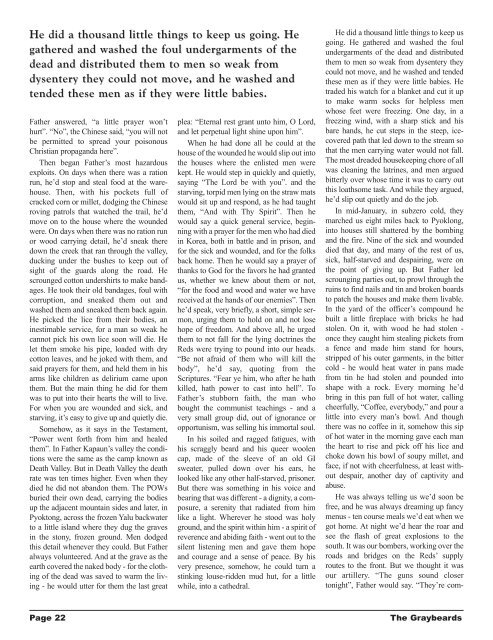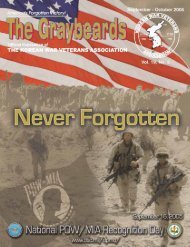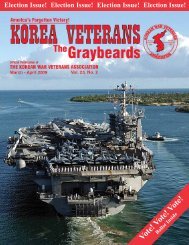The Graybeards – KWVA - Korean War Veterans Association
The Graybeards – KWVA - Korean War Veterans Association
The Graybeards – KWVA - Korean War Veterans Association
You also want an ePaper? Increase the reach of your titles
YUMPU automatically turns print PDFs into web optimized ePapers that Google loves.
He did a thousand little things to keep keep<br />
us going. going.<br />
He<br />
gathered and washed the foul undergarments of the<br />
dead and distributed them to men so weak from<br />
dysentery they could not move, and he washed and<br />
tended these men as if they were little babies.<br />
Father answered, “a little prayer won’t<br />
hurt”. “No”, the Chinese said, “you will not<br />
be permitted to spread your poisonous<br />
Christian propaganda here”.<br />
<strong>The</strong>n began Father’s most hazardous<br />
exploits. On days when there was a ration<br />
run, he’d stop and steal food at the warehouse.<br />
<strong>The</strong>n, with his pockets full of<br />
cracked corn or millet, dodging the Chinese<br />
roving patrols that watched the trail, he’d<br />
move on to the house where the wounded<br />
were. On days when there was no ration run<br />
or wood carrying detail, he’d sneak there<br />
down the creek that ran through the valley,<br />
ducking under the bushes to keep out of<br />
sight of the guards along the road. He<br />
scrounged cotton undershirts to make bandages.<br />
He took their old bandages, foul with<br />
corruption, and sneaked them out and<br />
washed them and sneaked them back again.<br />
He picked the lice from their bodies, an<br />
inestimable service, for a man so weak he<br />
cannot pick his own lice soon will die. He<br />
let them smoke his pipe, loaded with dry<br />
cotton leaves, and he joked with them, and<br />
said prayers for them, and held them in his<br />
arms like children as delirium came upon<br />
them. But the main thing he did for them<br />
was to put into their hearts the will to live.<br />
For when you are wounded and sick, and<br />
starving, it’s easy to give up and quietly die.<br />
Somehow, as it says in the Testament,<br />
“Power went forth from him and healed<br />
them”. In Father Kapaun’s valley the conditions<br />
were the same as the camp known as<br />
Death Valley. But in Death Valley the death<br />
rate was ten times higher. Even when they<br />
died he did not abandon them. <strong>The</strong> POWs<br />
buried their own dead, carrying the bodies<br />
up the adjacent mountain sides and later, in<br />
Pyoktong, across the frozen Yalu backwater<br />
to a little island where they dug the graves<br />
in the stony, frozen ground. Men dodged<br />
this detail whenever they could. But Father<br />
always volunteered. And at the grave as the<br />
earth covered the naked body - for the clothing<br />
of the dead was saved to warm the living<br />
- he would utter for them the last great<br />
plea: “Eternal rest grant unto him, O Lord,<br />
and let perpetual light shine upon him”.<br />
When he had done all he could at the<br />
house of the wounded he would slip out into<br />
the houses where the enlisted men were<br />
kept. He would step in quickly and quietly,<br />
saying “<strong>The</strong> Lord be with you”. and the<br />
starving, torpid men lying on the straw mats<br />
would sit up and respond, as he had taught<br />
them, “And with Thy Spirit”. <strong>The</strong>n he<br />
would say a quick general service, beginning<br />
with a prayer for the men who had died<br />
in Korea, both in battle and in prison, and<br />
for the sick and wounded, and for the folks<br />
back home. <strong>The</strong>n he would say a prayer of<br />
thanks to God for the favors he had granted<br />
us, whether we knew about them or not,<br />
“for the food and wood and water we have<br />
received at the hands of our enemies”. <strong>The</strong>n<br />
he’d speak, very briefly, a short, simple sermon,<br />
urging them to hold on and not lose<br />
hope of freedom. And above all, he urged<br />
them to not fall for the lying doctrines the<br />
Reds were trying to pound into our heads.<br />
“Be not afraid of them who will kill the<br />
body”, he’d say, quoting from the<br />
Scriptures. “Fear ye him, who after he hath<br />
killed, hath power to cast into hell”. To<br />
Father’s stubborn faith, the man who<br />
bought the communist teachings - and a<br />
very small group did, out of ignorance or<br />
opportunism, was selling his immortal soul.<br />
In his soiled and ragged fatigues, with<br />
his scraggly beard and his queer woolen<br />
cap, made of the sleeve of an old GI<br />
sweater, pulled down over his ears, he<br />
looked like any other half-starved, prisoner.<br />
But there was something in his voice and<br />
bearing that was different - a dignity, a composure,<br />
a serenity that radiated from him<br />
like a light. Wherever he stood was holy<br />
ground, and the spirit within him - a spirit of<br />
reverence and abiding faith - went out to the<br />
silent listening men and gave them hope<br />
and courage and a sense of peace. By his<br />
very presence, somehow, he could turn a<br />
stinking louse-ridden mud hut, for a little<br />
while, into a cathedral.<br />
He did a thousand little things to keep us<br />
going. He gathered and washed the foul<br />
undergarments of the dead and distributed<br />
them to men so weak from dysentery they<br />
could not move, and he washed and tended<br />
these men as if they were little babies. He<br />
traded his watch for a blanket and cut it up<br />
to make warm socks for helpless men<br />
whose feet were freezing. One day, in a<br />
freezing wind, with a sharp stick and his<br />
bare hands, he cut steps in the steep, icecovered<br />
path that led down to the stream so<br />
that the men carrying water would not fall.<br />
<strong>The</strong> most dreaded housekeeping chore of all<br />
was cleaning the latrines, and men argued<br />
bitterly over whose time it was to carry out<br />
this loathsome task. And while they argued,<br />
he’d slip out quietly and do the job.<br />
In mid-January, in subzero cold, they<br />
marched us eight miles back to Pyoklong,<br />
into houses still shattered by the bombing<br />
and the fire. Nine of the sick and wounded<br />
died that day, and many of the rest of us,<br />
sick, half-starved and despairing, were on<br />
the point of giving up. But Father led<br />
scrounging parties out, to prowl through the<br />
ruins to find nails and tin and broken boards<br />
to patch the houses and make them livable.<br />
In the yard of the officer’s compound he<br />
built a little fireplace with bricks he had<br />
stolen. On it, with wood he had stolen -<br />
once they caught him stealing pickets from<br />
a fence and made him stand for hours,<br />
stripped of his outer garments, in the bitter<br />
cold - he would heat water in pans made<br />
from tin he had stolen and pounded into<br />
shape with a rock. Every morning he’d<br />
bring in this pan full of hot water, calling<br />
cheerfully, “Coffee, everybody,” and pour a<br />
little into every man’s bowl. And though<br />
there was no coffee in it, somehow this sip<br />
of hot water in the morning gave each man<br />
the heart to rise and pick off his lice and<br />
choke down his bowl of soupy millet, and<br />
face, if not with cheerfulness, at least without<br />
despair, another day of captivity and<br />
abuse.<br />
He was always telling us we’d soon be<br />
free, and he was always dreaming up fancy<br />
menus - ten course meals we’d eat when we<br />
got home. At night we’d hear the roar and<br />
see the flash of great explosions to the<br />
south. It was our bombers, working over the<br />
roads and bridges on the Reds’ supply<br />
routes to the front. But we thought it was<br />
our artillery. “<strong>The</strong> guns sound closer<br />
tonight”, Father would say. “<strong>The</strong>y’re com-<br />
Page 22 <strong>The</strong> <strong>Graybeards</strong>

















